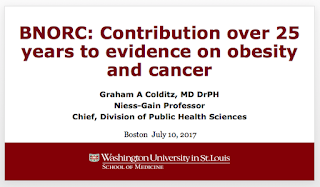At today’s annual symposium of the Boston Nutrition Obesity Research Center (BNORC), CNiC’s Dr. Graham Colditz delivered a plenary session talk reviewing BNOCR’s 25-year contribution to the science on obesity and cancer.
A past associate director of the Center, Colditz also paid tribute to groundbreaking nutrition researcher, George Blackburn, who passed away in February 2017 and played a key leadership role in establishing BNORC and fostering its important work. In addition to discussing Blackburn’s role in advancing such fields as obesity economics, chronic disease prevention, and bariatric surgery, Colditz also recounted how Blackburn’s driven nature also translated to his driving habits on Boston’s infamous roads, with oftentimes exciting results.
“George offered to drive me back to my office on Longwood Avenue,” said Colditz. “I accepted, and am pleased to say I survived a dash through city traffic with George at the wheel, a harrowing experience I expect many other here have shared over the years.”
Despite the stress his driving may have caused in others, Blackburn, and BNORC in general, did a great deal to help shape our current understanding of health and prevention. Key studies showed the important role of adult weight gain on the risk of heart disease and breast cancer – and that BMIs within the upper end of the “normal” weight range could still significantly increase the risk of diabetes and heart disease.
Findings like these played an important role in shaping national health policy, possibly most notably with the practical recommendation in the 1995 Dietary Guidelines for Americans that adults should “maintain or improve weight,” rather than simply focus on trying to achieve a healthy weight, which is not practical for many people. Simply avoiding future gain could have large benefits across many types of diseases and across the nation.
Other advances the work of BNORC played a role in was in identifying links between overweight and cancer, with much of this work foundational to a 2016 International Agency for Research on Cancer (IARC) report detailing the strong association between excess weight and 13 different cancers, including: breast, colon and rectum, endometrial, esophageal (adenocarcinoma), gallbladder, gastric, kidney (renal cell), liver, multiple myeloma, ovary, pancreas, and thyroid.
As our understanding of the weight-cancer link grows, said Colditz, we may in the future be better able to personalize lifestyle recommendations for people – to help them lower their future risk of cancer or improve their prognosis as cancer survivors. As well, we may better be able to understand how to allocate resources across the population for maximum impact.
“BNORC: Contribution over 25 years to evidence on obesity and cancer.“- Graham A. Colditz, MD, DrPH. Boston Nutrition Obesity Research Center Annual Symposium and Tribute to George Blackburn, MD PhD, Boston, MA (July 10, 2017).

